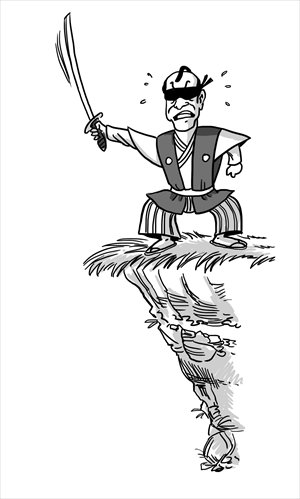Why South Korea is uneasy about Abe

Japan's newly elected Prime Minister Shinzo Abe is hardly a fresh face in the country's domestic politics. But the second coming of the right-wing politician and his cohorts has alerted Japan's neighboring countries, and has made South Koreans especially uneasy.
Will Abe aggressively push for a retraction of the 1993 Kono Statement, in which then chief cabinet secretary Yohei Kono officially issued an apology to wartime comfort women?
Moreover, if Abe's Japan continues to make claims on Dokdo, it will certainly create unbearable divisions between the two nations. Japan will undoubtedly draw harsh criticism from the international community as well as South Korea and China, which will erode Japan's international credibility.
With the US pivot to Asia, Japan may think that the Obama administration will maintain a neutral stance as it has done for the last five decades. Japan may also think that the US will support Japan should there be any Sino-Japanese conflict.
Such ideas are wishful thinking on Abe's part. No country will support Japan when it comes to historical issues. Wartime crimes such as the comfort women issue are at the core of human rights.
The comfort women issue entails a simple historical fact: The war-making state exploited vulnerable women in Korea and China during World War II. It was a crime against humanity. Rejecting such historical facts cannot be tolerated by the international community.
If Japan makes any move to justify its past wrongdoings or even distort the well-known facts of World War II, it will lose its international standing as a pacifist country.
If Japan takes a strong stance against China over the Diaoyu Islands while distorting historical issues, the Obama administration may not be as fully supportive as Abe expects.
Japan will have to risk its strong ties with the US, because most Americans know Japan committed wartime atrocities and may feel less committed to supporting a Japan that cannot face up to historical realities.
South Korea is a pluralistic society. We even debate and disagree on how to handle North Korea's nuclear development. Some promote a hard-line policy while others prefer engagement with Pyongyang. However, South Korea showcases a great level of national unity over Japan's claim on Dokdo and historical issues.
Dokdo is a South Korean national icon that symbolizes its sovereignty, and one that Japan once took away by force. Anytime Japan claims sovereignty over Dokdo, painful memories of Korea's past end up uniting South Koreans.
Japan doesn't want to remind South Korea of its history. It will only make the already strong Sino-Korean relations even tighter, because the two countries share a similar historical identity as victims. Japan's abnormal inability to face its own past degrades its own subtle culture, which many people around the world respect.
As a formidable global player, Japan should conform to international norms, and one way to do so is to accept South Korea's sovereignty over Dokdo and face up to its own historical actions.
If it does so, Japan may gain a lot more. It will earn South Korea and China's respect, which Japan is highly in need of nowadays.
Northeast Asia is a critical region that sustains the economic stability of the world. Unprecedented economic interdependence between South Korea, Japan and China empowers each country's economic development, social stability and technological innovation.
Despite differing political systems, Northeast Asian states aspire to further their economic development, which is critical to enhancing social welfare.
Citizens of each country enjoy their neighboring states' cultural accomplishments, and Japan needs good neighbors to recover from its long economic recession.
South Korea needs a responsible and respectable Japan. But Japan has kept South Koreans waiting too long. Irrespective of how future-oriented and functionally integrated Northeast Asia may become, the region will remain vulnerable to historical disputes as long as Japan cannot face its own history.
The author is an associate professor at the Department of Political Science and International Studies, Yonsei University in Seoul. opinion@globaltimes.com.cn